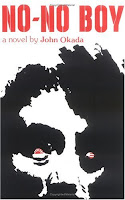This novel was a little bit strange. I mean, it was very straightforward as far as content and narrative trajectory are concerned, but it was weird because a lot of the characters felt like examples instead of substantive people. I think there are two categories for these "examples" too: the first-generation Japanese immigrants living in America, and the second-generation Japanese Americans born to those immigrants.
With regards to the first-generation immigrants, there are four main characters/groups: families like the Ashidas and like Ichiro's family who moved to America with the single-minded purpose of reaping what they could sow (wealth, education, etc.) without partaking in or assimilating to anything even remotely related to American culture; families like the Kumasakas who came for a similar reason but eventually grew to like it enough that they purchased a house after a few decades and decided maybe it wasn't so bad; families like Emi's who came for similar reasons, grew to like it, but asked to be repatriated when it became clear that America was going to put them in the internment camps; and families like Kenji's who were more open-minded about their immigration and grew to not only like America, but to adapt to and take on some aspects of American culture and lifestyle. Of all these families, the ones like the Ashidas and Ichiro's (or at least, his mother) are villainized -- they are often blamed (directly and indirectly) for their children's struggles and failures, and they are depicted as being literally insane. On the other end of the spectrum, the Kumasakas are depicted sympathetically while Kenji's father is blatantly idealized. In some ways, the novel is walking a fine line between providing an interesting array of characters and illustrating the complex factors at play in the younger generation's decisions to enlist, accept the draft, or become no-no boys and simply being an assimilationist text. I think it's unfair to say it's actually assimilationist propaganda, but I also think that it could be argued that an assimilationist vein runs throughout the novel.
As far as the second-generation Japanese Americans are concerned, there are also four types: those like Freddie who are no-no boys and are failing to survive now that the war has ended; those like Ichiro who are no-no boys but ultimately find a way to re-enter the lives that were interrupted by internment; those like Kenji who enlisted and either died or were severely injured because of the war, but who ultimately feel that it was worth it; and those like Eto who enlisted and fought but remain angry and insecure because they have returned and are not really being treated any more respectfully than before the war. In this case, Kenji is romanticized and the reader is asked to be sympathetic toward Ichiro.
The point of all of this is that Okada's novel tells a compelling story, but at times seems like its sole purpose is to get the American public (most likely the non-Japanese portion of it) to better understand and sympathize with the plight of Japanese immigrants and Japanese Americans in a post-WWII America. That's not to reduce the novel to this one point -- I think there are a lot of other very interesting things going on in this text, but I wanted to focus on this particular aspect of it.

0 comments:
Post a Comment